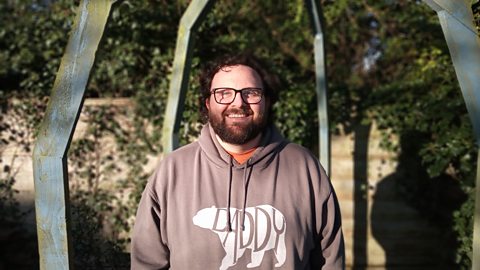
By Greg Baldwin
Secondary science teacher, who switched careers after two decades in the print industry
This article was updated in February 2023.
It is important that you go into teacher training with your eyes wide open. It isnŌĆÖt for everyone but has the potential to be an incredibly rewarding career.
There was pure disbelief in my wifeŌĆÖs voice when I told her that I no longer had a job. She was in the playground waiting to collect my five-year-old son from school. The news was totally unexpected, so it's fair to say that we were both in a state of shock.
When we began to recover our senses, we realised that ŌĆō far from being the worst thing that had ever happened to us ŌĆō this could be the fresh start that we'd been considering for a long time.
I'd been working in the print industry for around 20 years and had gradually taken on more responsibility and was earning more than I thought I ever would. However, I often felt unfulfilled and the thought of all my hard work simply lining someone elseŌĆÖs pockets was intensely frustrating.
Family and friends had been telling me that I would make a good teacher for years. Although I potentially agreed with them, I found the concept of changing career and taking a large drop in salary too overwhelming to consider. However, after researching the possibility on the internet, it became clear that there's plenty of support available.
If you're someone that feels a career in teaching would be more rewarding than what you're doing currently ŌĆō here are some things IŌĆÖve learnt that could help you get started.

Do your research
Subject to your location, there is plenty of expert advice available for people interested in teaching in , , and .
If you're in England, the can even assign you one-to-one support from an experienced teacher who can answer any questions you might have and give you personalised advice on what to do to get you on your way.
YouŌĆÖll also find a wealth of resources to help you kickstart your career in teaching including information on eligibility. In England, you need a degree and a GCSE grade C/4 in English and maths (plus science if you want to teach primary). The requirements are similar for Scotland, Wales, and Northern Ireland.
I was unsure whether my degree in psychology would be suitable for secondary teaching, but my advisor explained that ŌĆō subject to the potential completion of a Knowledge Enhancement Course ŌĆō my degree would be suitable for teaching biology.
Get some first-hand experience
It is important that you go into teacher training with your eyes wide open. It isnŌĆÖt for everyone but has the potential to be an incredibly rewarding career. If you're unsure, you can contact local schools to volunteer or just spend a day or two observing what goes on in a school.
If youŌĆÖre based in England, the service can help you arrange school experience with a local school. This will give you an opportunity to talk to teachers about day-to-day school life, observe teaching and pastoral work and watch a range of lessons and age groups being taught. In Scotland, you can contact Teach in Scotland who can help arrange experience in a school. The relevant bodies in Wales and Northern Ireland currently suggest that you contact local schools and youth organisation directly.
To begin with, I was undecided on whether I wanted to teach primary or secondary, but this experience allowed me to put some behaviour fears to rest about secondary school and realise that primary school wasn't the ŌĆśsunshine and rosesŌĆÖ experience I expected it to be either. Far from it just being hours of cutting and sticking every day, primary schoolteachers constantly provide evidence for the children in their classes. It also gave me the first glimpse into realising that teachers were a bunch of genuinely passionate, interesting, supportive, and like-minded people that I would enjoy spending the rest of my career working alongside.
As well as experience in schools, you can attend events that allow you to meet training providers, speak one-to-one with advisors and chat with experienced teachers to find out what life as a teacher is like. Previously taking place in hotels and exhibition centres, events are now being held online in and .
I cannot think of another career that would provide so much support for me to join and provides such a fulfilling aspect to my life.
Explore your options
If you decide that teaching is for you, there are several different routes available for career changers that depend on where youŌĆÖd like to teach and how youŌĆÖd like to be trained.
All options include a mix of university-based learning and on-the-job training, and depending on where you train, these might take different forms. In England, there are two main options, a Postgraduate Certificate in Education (PGCE) ŌĆō training split between university-led learning and ŌĆśon the jobŌĆÖ training in a school setting ŌĆō and School Centred Initial Teacher Training (SCITT) ŌĆō this option also includes university led learning but is usually more focused in the ŌĆśon the jobŌĆÖ training within a school setting. You typically spend more time in schools and there is even an option for being paid whilst you train. Both courses take one year to complete and are supported by a school-based mentor ŌĆō with a university-based mentor if you follow the PGCE route.
For me, the bursaries for science subjects were what made teacher training possible. The requirements change subtly every year, but you can check the funding options available via the .
The options in Scotland, Wales and Northern Ireland are largely similar although you will be unable to teach in Scotland without a Professional Graduate Diploma in Education (PGDE). There are a few other subtle differences between different parts of the UK so the of the UCAS website is a good place to look for more specific information.
I decided on a one-year PGCE with a local university for my training. Most SCITT courses require some experience in schools to ensure you are ready to 'hit the ground running' and I hadnŌĆÖt had the opportunity to do this first. Some people keen on the SCITT route seek employment as a Cover Supervisor (essentially an unqualified teacher that works at a school providing cover for lessons when a teacher is absent). Salaries for a Cover Supervisor are lower than that for a qualified teacher, but this might be an option for you if you need to earn an income whilst you're preparing to train.
Know what to expect
I am still enjoying teaching immensely. The benefits, for me, include:
School holidays. There is no denying that 13 weeks not working in school each year makes teaching a tempting career (although read on, because there is a flip side to this!)
Working with young people. It's incredibly refreshing, and the ŌĆślightbulbŌĆÖ moments when you see an idea take shape in a studentŌĆÖs mind for the first time are exhilarating.
Working with like-minded people has been an unexpected bonus for me. You get to work with people who share your interests and passions rather than being purely motivated by a wage or ticking each day towards retirement off the calendar.
My previous work and life experience have proved invaluable to my teacher training. Skills that I take for granted (like time management and organisational skills) made the rest of training infinitely easier. Younger trainees tend to lack this experience and so have had to learn about this whilst honing their teaching skills.
On the flip side:
Although teachers arenŌĆÖt ŌĆśteachingŌĆÖ for 13 weeks a year, they do work long hours and some spend time on school work during weekends and the school holidays too. found that:
- a quarter of teachers work more than 59 hours a week
- 10% work over 65 hours per week.
However, as a career changer, I've found it easier to manage my work-life balance and believe that my organisational skills have helped me to work more efficiently. Although I work long hours some weeks, I'm expecting my working hours to reduce as I become more efficient at planning and build a store of my own ready-made resources to rely on in future.
I regularly worked evenings and weekends in my previous job but, if this isnŌĆÖt for you, then you may need to consider how you'll make this work for you. That said, I know some teachers who are vehement about not taking work home, so they work at school until 5pm every day to avoid this. Most schools give you the flexibility to manage your own workload.
You'll have some students with difficult behaviour to manage. However, I remind myself that these students often have difficult lives and that our approach to them can make a big difference.
Having worked for companies before with swanky offices, healthcare plans and, for the right client, seemingly unlimited resources, teaching tends to be a bit more down-to-earth. I regularly buy stationery and classroom resources that arenŌĆÖt in the school budget.
Many teachers I spoke to when considering training and those I now work with refer to teaching as ŌĆśthe greatest job in the worldŌĆÖ. Although beer tester or restaurant critic might still seem appealing, I cannot think of another career that would provide so much support for me to join and provides such a fulfilling aspect to my life. Pupils will always keep you on your toes and you'll be asked questions that you couldnŌĆÖt have imagined in a million years.
To me, thatŌĆÖs worth a few late nights here and there.
Greg retrained as a science teacher with a specialism in biology in his early forties, and teaches Years 7 to 10 in Sheffield. He wrote this article for │╔╚╦┐ņ╩ų Teach in 2021 when he was an NQT. You can find out more about his story here.
To mark National Careers Week 2023, we have coverage that includes an interactive livestream workshop, beginning Monday 6 March.

Newly Qualified Teachers. video
A short series of films following five NQTs as they settle into their new roles in the middle of a pandemic.

Cancelled exams - how you can support your students. document
Useful tips from an assistant headteacher on supporting your students following this year's cancelled exams
